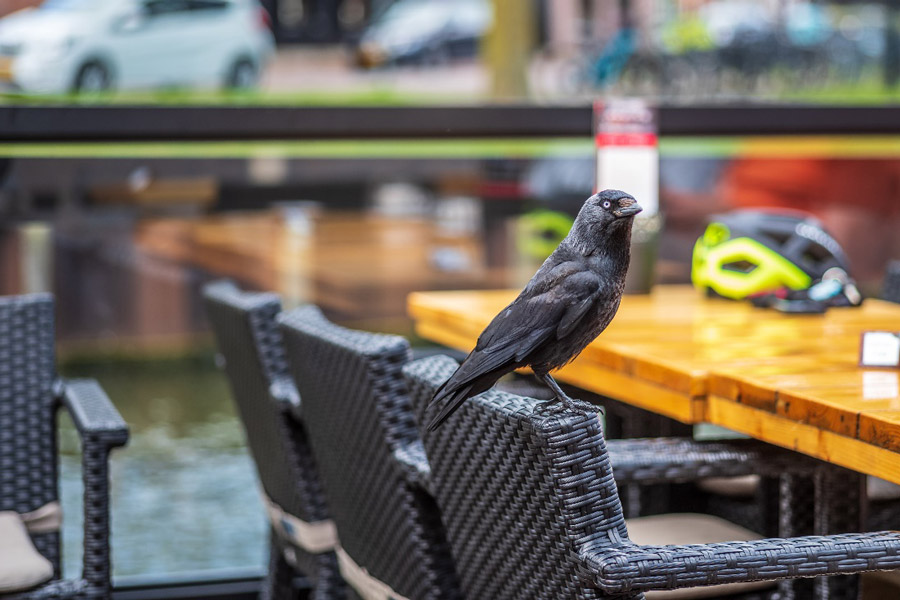Bodmin Jail, infamous as one of the most violent prisons in the United Kingdom, had a long history of deadly criminals and harsh sentencing methods. But this is not the only thing the prison is known for, as it also has an unusual history of anarchic Jackdaws causing havoc. Be wary of these feathery pickpockets, for they are swift and cunning!
A Forsaken Place
Bodmin Jail is named after the town of Bodmin on the edge of the wild Bodmin Moor in Cornwall, where it is located. Sir John Call conceived the need for a prison there in 1779, and it was built by prisoners of war (believed to be French, although this has not been confirmed).
King George III commissioned the construction of the prison, which soon developed a reputation for harshness and cruelty. The jail reportedly executed 55 people in its 150-year history. This number may appear large given the short duration of the jail, but such harsh sentencing was not out of the ordinary in England.
Cruel prison penalties were not uncommon in the 18th century. Indeed, the vicious and brutal legislation nicknamed England’s “Bloody Code” was in place from the late 17th century to the early 19th century. In plain terms, this was a policy that permitted jails to execute criminals, even if they had only committed minor offenses such as birthing a child out of wedlock, or even cutting down trees.

In theory, it is the right of the prison to determine their preferred method of hanging those sentenced to die. Between 1834 and 1856, the “standard drop” or “short drop” execution technique was often utilized at Bodmin Jail. A short drop execution results in the prisoner hanging and being strangled to death without their neck-breaking, a slow and gruesome way to take someone’s life.
The Witch Rose Wright
The reputation of Bodmin Jail is not however based entirely on the harsh treatment of its inmates. There is another tale which gave the prison an altogether most sinister reputation, and this concerns Rose Wright. Born in early 1811 in Luxunly, a little village near Bodmin Moor, she lived a life of notoriety.
- The Clink: The Oldest and Nastiest Prison in England?
- “Thou Shalt Not Suffer a Witch to Live”: The Witch-Cult Hypothesis
Wright’s dark magical powers were widely known in the area where she was believed to be a witch. The locals feared her supernatural abilities and treated her with the utmost respect in order to avoid antagonizing her.
This reputation was actually beneficial to Rose and the community alike, because they no longer had to fear each other. Wright was able to support herself by selling “potions” made up of herbal remedies as cures for a variety of ailments.
A severe drought struck the town one year, destroying the harvest and with it the residents’ incomes. Hunger is a tremendous motivator, and the prospect of starvation drove the locals to extremes.
Believing Wright had used her magical abilities to bring about the drought as a kind of retribution, the locals drove her away in the hopes that their fortunes would improve. Rose moved to a lonely corner of the forest after being shunned by the town and its citizens. She could no longer afford food because she didn’t have any customers to sell her herbal treatments to.
An Unusual Alliance
The jackdaw, resembling a small crow with a wild, pale eye, is a mischievous, noisy and gregarious bird. They’ve been known to steal food, raid garden feeders and even take the eggs of other birds. They are also highly intelligent problem solvers, as well as kleptomaniacs.
Desperately lonely, Rose Wright made friends with the many woodland animals with which she shared a home. One of the animals living in the forest that she found a particular preference for was the jackdaw. Wright became aware of their affinity for slyly taking things in a stealthy fashion after, one day, she had been brought a present of a few shillings from one of the Jackdaws.
After noting the Jackdaws’ penchant for shiny things, in her desperation Wright spent weeks training them to steal money from the townspeople. This strategy succeeded, and Rose was able to feed herself for a period. But this could not go on indefinitely; eventually, the locals would notice and demand that the local authorities bring her to justice.
Accordingly, local authorities convicted Rose Wright in 1846 at the age of 36. Years of living in the forest with little to eat had taken their toll on Wright who was suffering from malnutrition and dysentery. She was sentenced to prison, to be incarcerated in Bodmin Jail.

Wright did not arrive at the jail alone however, she was accompanied by jackdaws, her most faithful criminal accomplices. The wicked jackdaws continued to run amok, but this time within the jail’s walls. They were said to create strange noises at all hours of the day and night, and also taunted the guards and inmates. Generally raising a ruckus within the confines of the prison, they even attempted to take the keys from the prison guards.
Wright died only two months into her sentence. She was severely unwell when she was initially imprisoned. Given her physical condition, as well as the prison’s deplorable facilities and widespread dysentery, it’s no surprise she never made it out alive.
The Supernatural Jackdaws of Bodmin Jail
It’s said that the jackdaws continued to terrorize Bodmin Jail after her death. Many believe that Rose by a curse on the Jail, stating that “should the last Jackdaw be born at Bodmin Gaol, so the spirits of the condemned shall rise and bring misfortune and chaos to all that reside within.”
Bodmin Jail, a prison with a bloody and torturous history, was undoubtedly feared by the criminal class. Many mysteries lie hidden within the walls of this remote and evil place, but the mystery of the jackdaws, it seems, will be one that continues to this day.
Indeed, jackdaws inhabit the area to this day, ensuring that the cruel treatment of Rose Wright will never be forgotten.
Top Image: Is Bodmin Jail haunted by jackdaws because of a witch’s curse? Source: Springfield Gallery / Adobe Stock.
By Roisin Everard